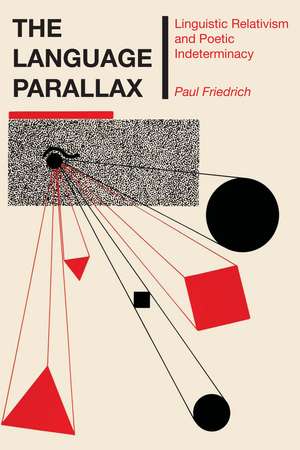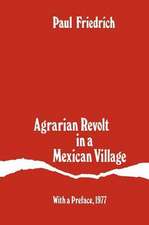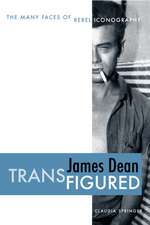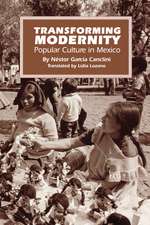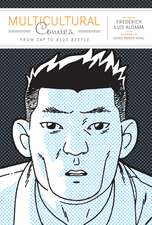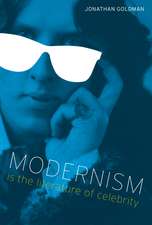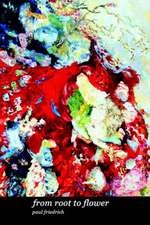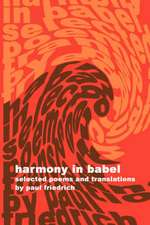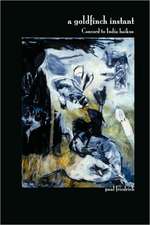The Language Parallax: Linguistic Relativism and Poetic Indeterminacy: Texas Linguistics Series
Autor Paul Friedrichen Limba Engleză Paperback – 1986
Paul Friedrich's The Language Parallax argues persuasively that the "locus and focus" of differences among languages lies not so much in practical or rational aspects as in the complexity and richness of more poetic dimensions—in the nuances of words, or the style and voice of an author. This poetic reformulation of what has been called "linguistic relativism" is grounded in the author's theory of the imagination as a main source of poetic indeterminacy. The reformulation is also based on the intimate relation of the concentrated language of poetry to the potential or possibilities for poetry in ordinary conversation, dreams, and other experiences. The author presents challenging thoughts on the order and system of language in their dynamic relation to indeterminacy and, ultimately, disorder and chaos.
Drawing on his considerable fieldwork in anthropology and linguistics, Friedrich interweaves distinct and provocative elements: the poetry of language difference, the indeterminacy in dialects and poetic forms, the discovery of underlying orders, the workings of different languages, the strength of his own poetry. The result is an innovative and organic whole.
The Language Parallax, then, is a highly original work with a single bold thesis. It draws on research and writing that has involved, in particular, English, Russian, and the Tarascan language of Mexico, as well as the personal and literary study of the respective cultures. Anthropologist, linguist, and poet, Friedrich synthesizes from his experience in order to interrelate language variation and structure, the creative individual, ideas of system-in-process, and questions of scientific and aesthetic truth. The result is a new view of language held to the light of its potentially creative nature.
Din seria Texas Linguistics Series
-
 Preț: 430.34 lei
Preț: 430.34 lei -
 Preț: 262.40 lei
Preț: 262.40 lei - 23%
 Preț: 467.38 lei
Preț: 467.38 lei -
 Preț: 350.64 lei
Preț: 350.64 lei -
 Preț: 277.16 lei
Preț: 277.16 lei -
 Preț: 158.36 lei
Preț: 158.36 lei
Preț: 166.47 lei
Nou
Puncte Express: 250
Preț estimativ în valută:
31.86€ • 34.62$ • 26.78£
31.86€ • 34.62$ • 26.78£
Carte tipărită la comandă
Livrare economică 22 aprilie-06 mai
Preluare comenzi: 021 569.72.76
Specificații
ISBN-13: 9780292746510
ISBN-10: 0292746512
Pagini: 206
Dimensiuni: 152 x 229 x 16 mm
Greutate: 0.45 kg
Editura: University of Texas Press
Colecția University of Texas Press
Seria Texas Linguistics Series
ISBN-10: 0292746512
Pagini: 206
Dimensiuni: 152 x 229 x 16 mm
Greutate: 0.45 kg
Editura: University of Texas Press
Colecția University of Texas Press
Seria Texas Linguistics Series
Notă biografică
Paul Friedrich is Professor Emeritus of Anthropology, of Linguistics, and in the Committee on Social Thought at the University of Chicago.
Cuprins
- Paul Friedrich: An Appreciation, by William Bright
- Acknowledgments
- 1. Introduction
- 2. A Background History of Linguistic Relativism
- 3. Linguistic Relativism and Poetic Indeterminacy: A Reformulation of Sapir’s Position
- 4. Indeterminacy in Linguistic Fieldwork
- 5. The Poetry of Language in the Politics of Dreams
- 6. The Unheralded Revolution in the Sonnet: Toward a Generative Model
- 7. The Poem as Parallactic Position: Seven Poems
- 8. Linguistic Relativity and the Order-to-Chaos Continuum
- 9. Toward an Improved Theory of Linguistic Relativism and Poetic Indeterminacy
- Notes
- Bibliography
- Permission Notices
- Index of Names and Titles
- Subject Index
Recenzii
This is a unique and personal book.... Friedrich emerges in this book as a kind of poet/scholar, who brings together examples of his own vivid dreams, fine poems, and linguistic fieldwork in Mexico to fashion a sort of praise poem, a gently impassioned, extended hymn to the cultural significance of human imagination.
Descriere
Paul Friedrich's The Language Parallax argues persuasively that the "locus and focus" of differences among languages lies not so much in practical or rational aspects as in the complexity and richness of more poetic dimensions—in the nuances of words, or
